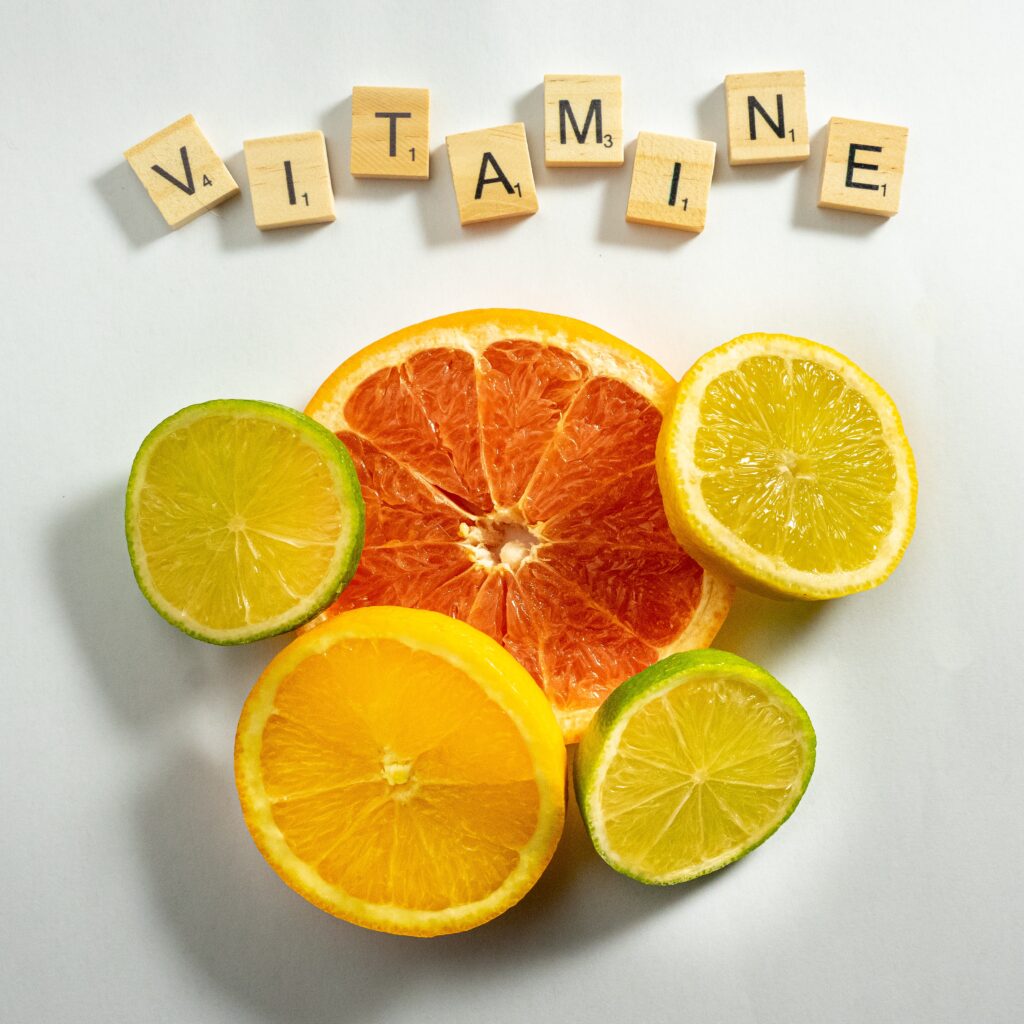What Is Vitamin C ?
Vitamin C, also referred to as ascorbic acid, is a vital water-soluble vitamin that plays a crucial role in the proper functioning of the human body. It is not produced by the body, so it must be obtained through dietary sources or supplements. Vitamin C is renowned for its antioxidant properties, which means it helps protect cells from damage caused by harmful free radicals.
This vitamin is crucial for various bodily functions, including the synthesis of collagen, a protein that supports skin, blood vessels, and connective tissues. It is also vital for a healthy immune system, as it aids in the production and function of white blood cells, which defend the body against infections. Additionally, it helps the body absorb iron from plant-based sources, assists in wound healing, and plays a role in maintaining healthy bones and teeth.
A deficiency in vitamin C can lead to health problems, including scurvy, a condition characterized by weakness, anemia, and gum disease. Therefore, including vitamin C-rich foods in one’s diet is important for overall health and well-being.
Immune System Support
Vitamin C plays a vital role in strengthening your immune system. It enhances the production of white blood cells, which help your body fight infections more effectively.
Antioxidant Power
As a potent antioxidant, vitamin C combats harmful free radicals in your body. This can reduce the risk of chronic diseases and slow down the aging process.
Foods High in Vitamin C
Many foods are rich sources of vitamin C, which is essential for maintaining good health. Citrus fruits are renowned for their abundant vitamin C content. Other fruits such as strawberries, kiwi, and papaya also provide significant amounts of this vitamin. Vegetables like bell peppers, broccoli, and Brussels sprouts are excellent sources, too. Additionally, some tropical fruits like guava and pineapple contain substantial levels of vitamin C. It’s important to include these foods in your diet to ensure you meet your daily requirements, as this nutrient plays a vital role in boosting the immune system, supporting skin health, and promoting overall well-being.
Citrus Fruits
Citrus fruits such as oranges, lemons, and grapefruits are well-known for their abundant vitamin C content. They make for delicious snacks and can be easily incorporated into your daily diet.
Berries
Strawberries, blueberries, and raspberries are not only rich in antioxidants but also provide a significant amount of vitamin C.
Leafy Greens
Vegetables like spinach, kale, and broccoli are excellent sources of vitamin C, offering a healthy dose of this nutrient while promoting overall well-being.
Is It OK to Have Vitamin C Every Day?
Yes, it is generally recommended to have vitamin C every day. It is water-soluble, meaning it’s not stored in the body, and regular intake is necessary to maintain optimal health. Including vitamin C-rich foods in your daily diet, like fruits and vegetables, can help support your immune system, boost collagen production for healthy skin, and act as a powerful antioxidant to combat oxidative stress.
Most people can safely consume it daily through their diet, but it’s advisable to consult with a healthcare professional before taking any supplements, especially if considering high doses.
Daily Recommended Intake
The recommended daily intake of vitamin C varies by age and gender, but generally, adults should aim for around 65-90 milligrams per day. It’s safe to consume daily, either through your diet or supplements, as long as you don’t exceed the recommended doses.
Does Vitamin C Lighten Skin?
It is often included in skincare products due to its potential to brighten and even out skin tone, but it’s essential to clarify that it doesn’t lighten skin in the way some might interpret. Instead, it can help reduce the appearance of dark spots, sun damage, and hyperpigmentation, which can make the skin appear more radiant and uniform.
This is achieved by inhibiting the production of melanin, the pigment responsible for skin coloration, and by promoting collagen production, which can improve skin texture and overall luminosity. While vitamin C can contribute to a healthier, more glowing complexion, it doesn’t alter your natural skin color. It’s essential to use its products as part of a broader skincare routine and practice sun protection to maximize its benefits.
Why Is Vitamin C Good for Skin?
This vitamin is highly beneficial for the skin due to its various skincare properties. Firstly, it is a potent antioxidant that helps protect the skin from damage caused by free radicals and UV rays, which can lead to premature aging and skin cancer. Secondly, It promotes collagen production, a protein that is essential for maintaining skin’s elasticity and preventing wrinkles and fine lines.
Additionally, it can fade hyperpigmentation and dark spots, resulting in a more even skin tone. Moreover, this vitamin is known to hydrate the skin and reduce redness and inflammation. Overall, vitamin C’s combination of antioxidant, anti-aging, and skin-brightening properties makes it a valuable component of skincare routines for achieving healthier and more youthful-looking skin.
Collagen Production
This Vitamin is crucial for the synthesis of collagen, a protein that maintains skin’s elasticity and firmness. By promoting collagen production, it helps to combat wrinkles and fine lines.
Protection from UV Damage
Vitamin C acts as a natural sunscreen, protecting your skin from the harmful effects of UV radiation. It can minimize sunburn and reduce the risk of skin cancer.
Which Vitamin Helps for Skin Whitening?
Vitamin C is often associated with skin brightening and may help improve the appearance of the skin by reducing dark spots, hyperpigmentation, and uneven skin tone. However, it’s important to note that the term “skin whitening” is a bit misleading and can carry negative connotations.
Instead of altering your natural skin color, it works to enhance skin radiance and promote a more even complexion. Always approach skincare with the goal of achieving healthy and glowing skin rather than attempting to change your skin color, which is a practice best avoided.
Does Vitamin C Remove Tan?
Vitamin C can be effective in reducing the appearance of a tan, particularly when it is caused by sun exposure. This is because It has properties that can inhibit melanin production, the pigment responsible for skin coloration. When used consistently, products containing this vitamin can help fade sun-induced tans and dark spots, leading to a more even skin tone.
However, it’s crucial to remember that sun protection is the best way to prevent tanning and skin damage in the first place. While it can be a helpful addition to your skincare routine, it should not replace the use of sunscreen to prevent tanning and protect against harmful UV rays.
Is Vitamin C Good for Face Glow?
Yes, It is excellent for achieving a glowing complexion. It’s a potent antioxidant that helps protect the skin from damage caused by environmental factors and UV rays, which can lead to a dull complexion. It also promotes collagen production, improving skin elasticity and suppleness, and it can reduce the appearance of dark spots and hyperpigmentation, resulting in a more radiant and even skin tone. Including this Vitamin in your skincare routine can contribute to a healthy, glowing face.
Achieving a Radiant Complexion
Vitamin C’s antioxidant properties rejuvenate the skin, leaving it looking fresh and radiant. It can even out skin tone, reduce dullness, and give your face a healthy glow.
Read my other article on the topic of Hair’s Potential: Mighty Tips to Overcome
Conclusion:
Vitamin C is undeniably a superhero nutrient, offering a plethora of benefits for your health and skin. From supporting your immune system to promoting a radiant complexion and even aiding in tan removal, it should be a staple in your daily routine. Incorporate vitamin C-rich foods into your diet and explore skincare products that harness its incredible potential for glowing, healthy skin.






2 thoughts on “Unlocking the Secrets of Vitamin C: Benefits for Skin and Overall Health in 2025”